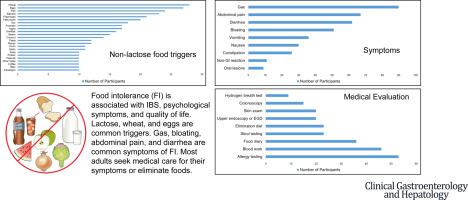Clinical Gastroenterology and Hepatology ( IF 11.6 ) Pub Date : 2021-12-21 , DOI: 10.1016/j.cgh.2021.12.021 Claire L Jansson-Knodell 1 , Mattie White 2 , Carolyn Lockett 1 , Huiping Xu 3 , Andrea Shin 1

|
Background & Aims
The impact of different types of food intolerance on gastrointestinal symptoms and quality of life (QOL) is poorly understood. We aimed to investigate associations of food intolerance and type of intolerance with irritable bowel syndrome (IBS), health-related QOL, and psychological symptoms.
Methods
We conducted an observational study of United States-based adults through an online survey. Demographics, culprit foods, symptoms, medical evaluation, Rome IV criteria for IBS, health-related QOL (Short-Form Health Survey 12), and anxiety and depression scores (Hospital Anxiety and Depression Scale) were collected in participants with self-reported food intolerance (lactose, non-lactose food, lactose plus food intolerance), and controls with no intolerance. Univariable associations of group with study endpoints were analyzed with the Kruskal-Wallis and Pearson χ2 or Fisher exact test. Multivariable comparisons were analyzed by logistic and linear regression.
Results
A total of 197 patients with (59 lactose, 61 non-lactose food, 77 lactose plus food intolerance) and 273 patients without intolerance participated. Lactose, wheat, and eggs were the most common food triggers. Gas (54.2%), abdominal pain (40.2%), and diarrhea (37.3%) were frequently reported symptoms of food intolerance. Reactions caused 57.8% to eliminate the food. Rates of IBS, abnormal anxiety scores, and abnormal depression scores were highest in lactose plus food intolerance; Short-Form Health Survey 12 scores were lowest in lactose plus food intolerance. Multivariable analyses revealed all intolerance subgroups were more likely to have IBS than controls.
Conclusions
Food intolerance is associated with IBS, anxiety, depression, and decreased health-related QOL and frequently leads to food elimination. Adults with lactose and lactose plus food intolerance have higher rates of IBS, increased psychological symptoms, and poorer QOL.
中文翻译:

食物不耐受与肠易激综合症、心理症状和生活质量的关联
背景与目标
人们对不同类型的食物不耐受对胃肠道症状和生活质量 (QOL) 的影响知之甚少。我们的目的是调查食物不耐受和不耐受类型与肠易激综合征 (IBS)、健康相关的生活质量和心理症状之间的关系。
方法
我们通过在线调查对美国成年人进行了观察性研究。收集参与者自我报告食物的人口统计数据、罪魁祸首食物、症状、医学评估、IBS 罗马 IV 标准、健康相关 QOL(简式健康调查 12)以及焦虑和抑郁评分(医院焦虑和抑郁量表)不耐受(乳糖、非乳糖食物、乳糖加食物不耐受),以及无不耐受的对照。使用 Kruskal-Wallis 和 Pearson χ 2或 Fisher 精确检验分析组与研究终点的单变量关联。通过逻辑回归和线性回归分析多变量比较。
结果
共有 197 名患者(59 名乳糖不耐受患者、61 名非乳糖食物不耐受患者、77 名乳糖加食物不耐受患者)和 273 名无不耐受患者参与。乳糖、小麦和鸡蛋是最常见的食物诱因。胀气(54.2%)、腹痛(40.2%)和腹泻(37.3%)是常见的食物不耐受症状。反应导致 57.8% 的人放弃了食物。乳糖加食物不耐受者的 IBS、异常焦虑评分和异常抑郁评分发生率最高;简短健康调查 12 在乳糖和食物不耐受方面得分最低。多变量分析显示,所有不耐受亚组比对照组更有可能患有肠易激综合症。
结论
食物不耐受与肠易激综合症、焦虑、抑郁和健康相关生活质量下降有关,并且经常导致食物消除。患有乳糖和乳糖加食物不耐受的成年人患肠易激综合征(IBS)的几率更高,心理症状更严重,生活质量更差。











































 京公网安备 11010802027423号
京公网安备 11010802027423号